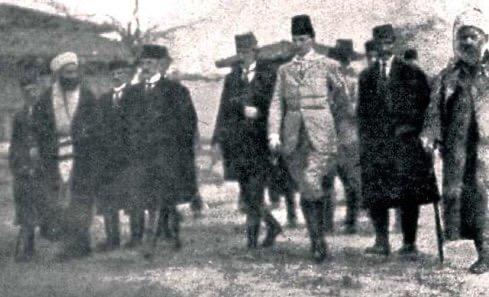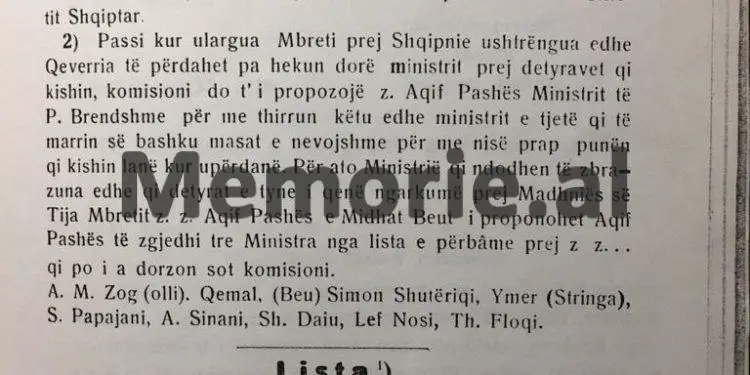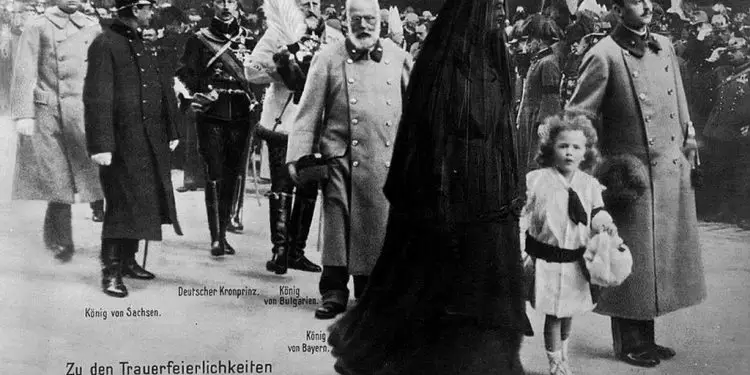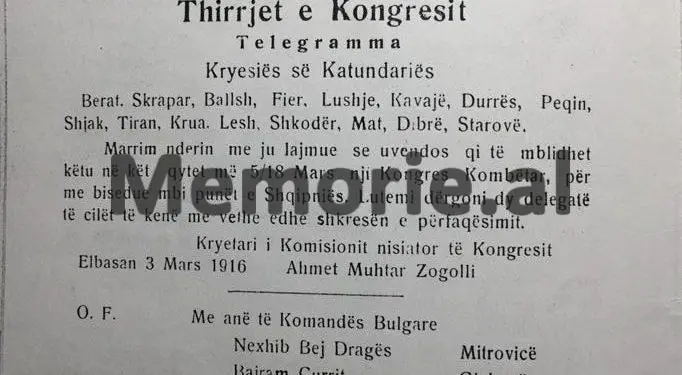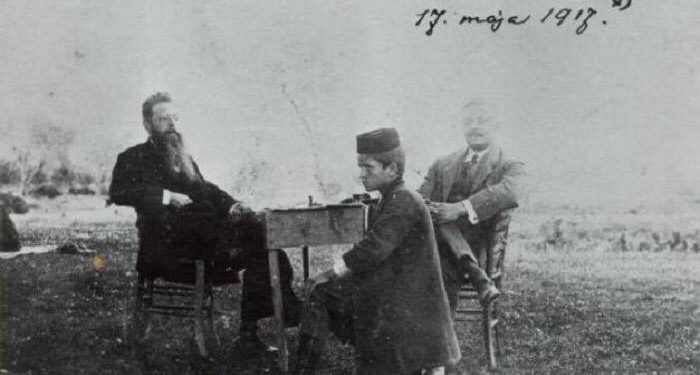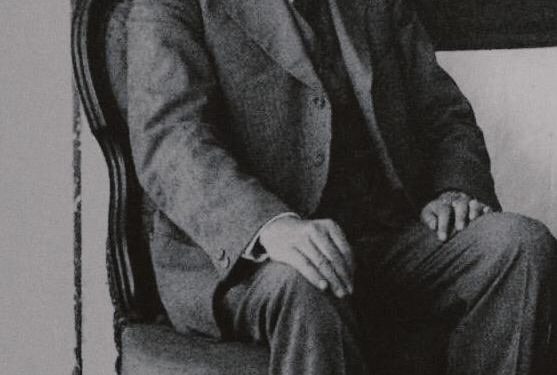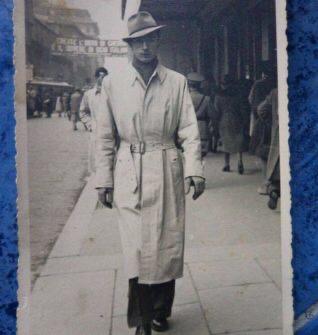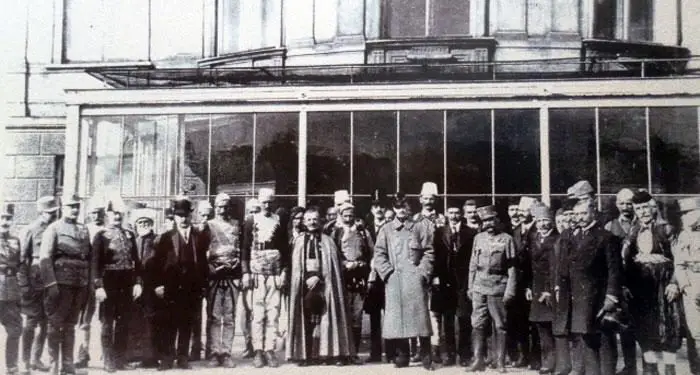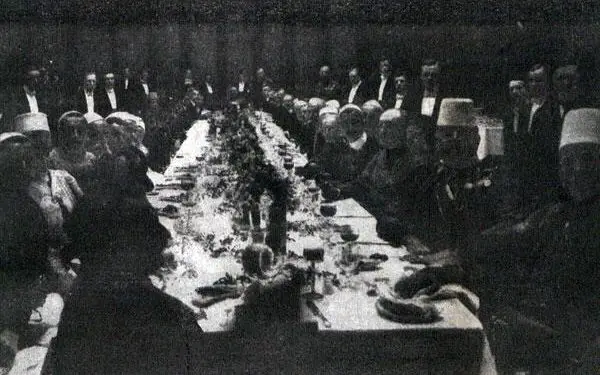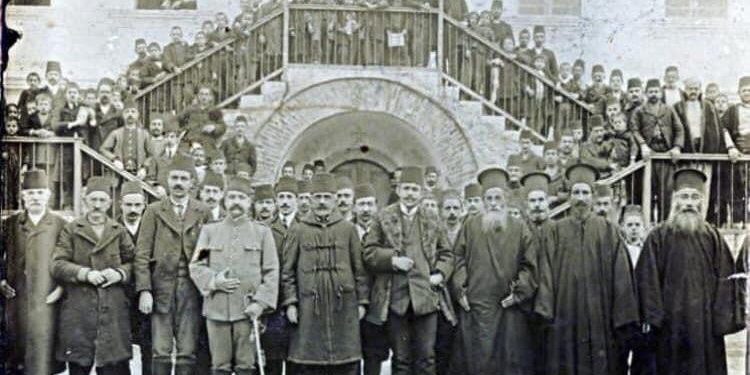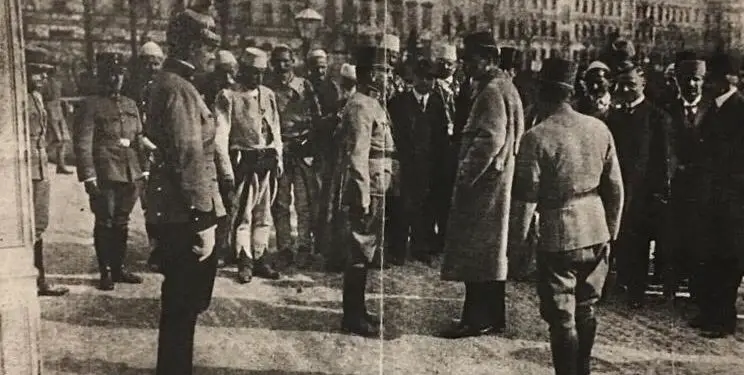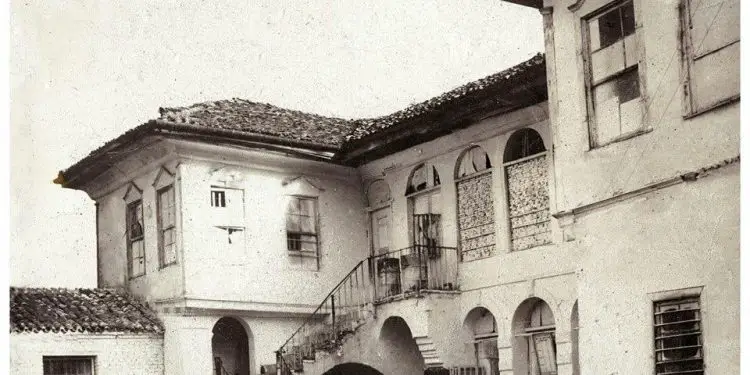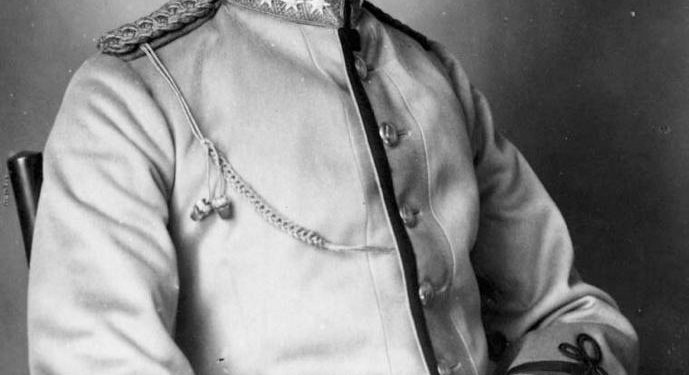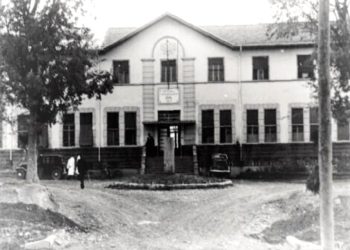Dashnor Kaloçi
Memorie.al publishes the unknown story of the National Congress of Elbasan which was prepared to be held on March 16, 1916, which would be attended by some of the most prominent Albanian politicians and patriots of that time, such as: Ahmet Bej Zagolli, Qemal Bej Elbasani, Ahmet Efendi Haxhisinani, Ymer Efendi Stringa, Shefqet Daiu, Sava Papajani, Simon Shuteriqi, Thanas Floqi, Lef Nosi, etc., which aimed to strengthen the Albanian state. The whole unknown history of the National Congress of Elbasan which was deleted and falsified from the official historiography of the pre-90s, because it was organized by some of the most prominent politicians and patriots of that time, with headed by Ahmet Zogu who was the chairman of the Commission that initiated the holding of that Congress, where most of them were imprisoned, interned, or shot by the communist regime of Enver Hoxha since his coming to power in late 1944.
One of the greatest events that occurred after the declaration of independence of Albania, in November 1912 until the Congress of Lushnja, remains that of the efforts to hold the Congress of Elbasan, on March 16, 1916. What was the Congress of Elbasan, who was the people who tried to keep him and what would he sanction? If we look at the “History of Albania” (published in 1984) in its third chapter, which speaks and treats the period from 1914 -1921, this event is talked about very briefly and it is summarized in five lines (p. other lines for the prohibition of this Congress, by the Austro-Hungarian authorities (p.176). But even in these few lines that talk about the efforts to hold this Congress in Elbasan, the names of political figures and personalities of that time, who dealt with its organization are not given.
Regarding this event, while the official historiography of the communist regime before the ’90s accepts the policy of Austria-Hungary in Albania, as: “invasive and aimed at not leaving the creation of an independent Albanian state and united ”, the holding of the Congress of Elbasan, by a group of patriotic Albanian politicians, who aimed at the self-government of the country and the return to Albania of Prince Vidi, which was considered a symbol of independence and sovereignty, have treated as secondary and without interest. This Congress, or more precisely the efforts to hold it, do not appear in this chapter, deleting it completely from the textbooks of the history of Albania, as the main politicians who were in charge of it, such as: Ahmet Zogu (one of the main organizers for holding it Fejzi Alizoti, Lef Nosi, Mehdi Borshi, etc., were declared “enemies of the people” by the communist regime and were shot or exiled. For more about this congress we are publishing the documents and writings that were published in the press of the time, giving it in written language as they were published by the press of that time.
Elbasan Congress in the documents of the time when it was held
(Minutes of 18 February 1916)
In today’s meeting in which Mr. Ahmet Bej Zagolli, Qemal Bej Elbasani, Ahmet Efendi Haxhisinani, Ymer Efendi Stringa, Shefqet Daiu, Sava Papajani, Simon Shuteriqi, Thanas Floqi and Lef Nosi took place, the joint commission decided the following:
On April 2, a national congress will be convened in Elbasan to discuss the state of affairs of the homeland today and the measures to be taken to strengthen the Albanian state.
Since when the King left Albania, the Government was also forced to use the duties of the minister without hesitation, the commission will propose to Mr. Aqif Pasha, Minister of Internal Affairs, to call me here and other ministers, to take measures together again the work they had left when they were separated. For those Ministers who are vacant and whose duties have been entrusted to him by His Relation to the King Mr. Aqif Pasha and Mid’hat Bey, it is proposed to Aqif Pasha to elect three Ministers from the list consisting of Z…. which he is handing over to the commission today. A.M. Zogolli, Qemal, (Beu) Simon Shuteriqi, Ymer (Stringa), S.Pajajani, A.Sinani, Sh. Daiu, Lef Nosi, Th. Floqi.
List (After the votes won in the commission voting), Kara Seid Pasha (9 votes), Luigj Gurakuqi (9), Ahmet Muhtar Zogolli (8), Lef Nosi (7), Hasan Bej Prishtina (3), Kristo Floqi (3 ), Grigor Cilka (3), Refik Bej Toptani (3), Qemal Bej Elbasani (3), Feizi Alizoti (2), Pandeli Cale (2), Mehmet Ali Bej Zaimi (2), Sotir Peci (1), Nexhip Bej Draga (1), Mehdi Borshi (1), Ahmet Dakli (1). (Mr. Ahmet Muhatar Zogolli and Lef Nosi did not accept).
Calls of Congress
Telegram to the Presidency of Katundari, Berat, Skrapar, Ballsh, Fier, Lushnje, Kavaja, Durrës, Peqin, Shijak, Tirana, Krumë, Lesh, Shkodër, Mat, Dibër, Starovë.
We take the honor of being allowed to convene here in this city on March 5/18 a National Congress, to discuss the affairs of Albania. Please send two delegates, who have with them the letter of representation.
Chairman of the Initiating Committee of Congress
Ahmet Muhtar Zogolli
Elbasan 3 March 1916 OF
By the Bulgarian Command Nexhip Bey Draga (Mitrovica), Bajram Curri (Gjakova), Hasan Bey Prishtina (Pristina), Mehmet Pasha Dërralla (Tetovo). We are honored to announce that it was decided to convene here on March 5/18, an Albanian National Congress, to discuss the affairs of Albania.
Please notify me immediately of all the cities in your district, so that I can be represented by two delegates, who must have representation documents with them.
Chairman of the Initiating Committee of Congress
Ahmet Muhtar Zagolli
Elbasan 3 March 1916.
By the Bulgarian Command, Albanian Colonies, Bucharest, Sofia, Lausanne. We have the honor to announce to gather here on March 5/18, an Albanian National Congress, to discuss the affairs of Albania. Please be represented by two delegates who have representation documents with them. Shk. Tija Prenk Bibdode Pasha Shkodër… Please order us and honor us with two delegates from Mirdita. To the Honest Child of the Toptans Tirana…
Please command me to happen in it, glorious Lord August Kral. All of us Albanians feel great joy in your coming to Albania, today when the country is in great need of the help of your lordship, whom you have always loved and you have always tried hard to give way to progress. The name of your lordship lives on in the hearts of all true patriots, who know well how much you have worked for our beloved homeland in the past, and it gives us hope that you will continue to work as you have worked for our cause national. The hope that you have supported with your lord, gave us courage and we decided to hold on March 18, here a National Congress through which to bring unity and brotherhood, between the Albanian tribes and to think that it should be done that our homeland after this take the path of progress and know and enjoy the freedom that are being given today by the excellent weapons of the three-member Austro-Hungarian army, from which we expect the expansion of the borders, following the principle of nationality. Waiting for the approval of your lord also valuable advice on the work that the congress will do.
I remain yours forever.
Chairman of the Commission, Ahmet Bej Zogolli.
Berat Prefecture O.T. No.502.
Ihsan Bey Leskovikut
From the voting letter given to us by all the people of Leskovik, it is understood that your Excellency, you have elected a representative on behalf of the sub-prefecture of Leskovik, to participate in the general congress, which has been decided to participate in Elbasan in 18 maj allafranga. Therefore, after the necessary actions have been taken by the prefecture, you are given this official document that proves the burden that has been placed on you. Deputy Mayor of Berat, Sulejman Luzati. February 29, 1916.
The stumbling blocks of Congress
O.F. Elbasan March 20, 1916.
The honest municipality of Elbasan
I have the honor to communicate with you, that after the opinion of doctors the risk of increasing cholera in the city of Elbasan, can be considered as leaving, as nothing new has appeared. So I received the order to set up the military cordon of my men tomorrow morning. Again, please know that anyone who wants to go to the region of Durrës, i.e., west of the line Skalnjeri Bazar Shijak Arzen, must have the permission of the commander of Durrës.
The permit deals with the mediation of the Elbasan command. In addition, in order to avoid disputes, it was instructed that for every trip civilians must have the passports of the Elbasan command, although they are not mandatory. At the very end, we pray that assemblies that have a political purpose are prohibited in areas violated by the imperial army, whereas in time of war the Austro-Hungarian ones are prohibited. If economic assemblies are invented, there is a need to obtain the full program of the assembly in question with the permission of the commander-in-chief.
St.K. No.121.
Commander of Elbasan Czapek Mjn
Zog’s departure to Austria
The Austrian government took measures for the non-holding of the Elbasan Congress and did so through the numerous military forces it had in Albania. Thus the convened congress could not be held. The Austrian authorities, seeing that this could bring on internal unrest, were not interested in such a thing. So he decided to send for a meeting, the chairman of the initiative commission for holding the congress, Ahmet Zogu, with Prince Windichgraetz. The purpose of this meeting organized by the Austrians was to convince Zog for a bilateral cooperation. In these talks, the Austrians promised Zog the rank of colonel, which he refused. August Kral decided to meet Zog in person. So the King summoned him to his office in Shkodra to hear Zog’s objections regarding Austro-Albanian cooperation. From the beginning of the conversation, Zogu stressed to the King that Austria had come to Albania to expel Serbia and not to interfere in its internal affairs. Zogu insisted that the administration should be under Albanian control. Thus the Austrians were faced with two alternatives, either to arrest him or to seduce him. So, they decided on the second option and invited Ahmet Zogu on a tourist trip to the Dalmatian coast, together with his trusted people and an Austrian officer. During this trip the Austrians, according to the orders of Vienna, did him all possible honors, even though he had not turned 21 years old. During this voyage, Zogu visited military installations in Dalmatia, as well as the Austro-Hungarian navy. When he returned to Shkodra, the Austrian commander of the country again made the same proposal to Zog for bilateral cooperation. Convinced that during the tourist voyage Zogu had seen well the Austrian military force and any opposition to it would be in vain. But Zogu agreed to co-operate on the condition that the administration be under Albanian control. The Austrians then arrested his personal secretary and declared non-compliance with the Elbasan Congress, dispersing all military personnel associated with him. This climate of tension would lead to an armed clash between Austro-Hungarian troops and Ahmet Zogu’s loyal military, which would result in casualties on both sides. Austro-Hungarian troops would continue the campaign of arrests against his men, forcing Zog to leave Elbasan for Mat. The Austrians then summoned Zog to Shkodra and to convince him that they had no bad intentions towards Albania; on February 23, 1916 they issued a proclamation recognizing the independence of the Albanian state. On November 21 of the same year, the Austrian Emperor Franz Joseph died and an Albanian delegation, of which Zogu himself was a participant, left for Vienna. But after the homage ended, the Austrians, judging by the possible danger he might bring as a person, decided to keep him there and not allow him to return to Albania. Despite his protests, Ahmet Zogu was forced to stay in Vienna until the end of the First World War in 1918.
Elbasan Congress in the official version of historiography before the ’90s
The policy of the Austro-Hungarian occupation authorities was strongly supported by the Catholic clergy of Shkodra, who had previously been the main spokespersons of Vienna’s policy in Albania the position of the Catholic Church, to expand its anti-national activity, and to secure a way of ruling in Albania. Albanian political personalities such as Bajram Curri, Aqif Pasha Elbasani, Luigj Gurakuqi, etc. They hoped that Austria-Hungary would not oppose the recovery of the independent Albanian state, including Kosovo of an Albanian government and to return to Albania Vilhelm Ëidin whom, due to the appointment by the Powers as head of the Albanian state, they continued to call as a symbol of the independence and sovereignty of this state. In this regard, preparations were made to start in Elbasan on March 18, 1916, a national congress but these ended without results. Because the Austro-Hungarian invaders fought hard against any attempt of the Albanians that contradicted their expansionist plans in Albania. The governors of Vienna were of the opinion that there should no longer be an independent and united Albanian state. In some districts, mainly the military ones which played an important role in the political life of Austria-Hungary, there was an opinion about the partition of Albania and its annexation by official Vienna. Other districts, especially that of the Ministry of Foreign Affairs, were of the opinion that the Albanian state should definitely be placed under the effective Austro-Hungarian protectorate while the southern part passed to Constantinople Greece. The pretext for drafting such hostile plans was the reactionary opinion of the “immaturity” of the Albanians for self-government, behind which was hidden the intention of Vienna to see post-war Albania no longer an apple of discord with Italy as in 1915, but the whole involved within Austria-Hungary and to prevent Italian penetration into the Balkans. In accordance with these plans, the invading Austro-Hungarian authorities acted in Albania. They stopped the meeting of the Congress of Elbasan, dissolved the Albanian administration under the leadership of Aqif Pasha of Elbasan, and in order not to recognize the existence of the Albanian state, opened Albanian schools, formed the “literary community” for the Albanian language, organized a civil administration with Albanian officials, but in their military control. The center of the Albanian administration was located in Shkodra where they created the general directorate of finance, education, justice, etc.”
April 1916, Speech by Interior Minister Aqif Pasha
Elbasan on April 14, 1916.
Prefectures Berat, Durrës
Due to the military actions, the government of Albania will be temporarily taken over by the Army of the Great Kingdom of Austria-Hungary, from this minute I am leaving office. As there is a need for all sub-prefectures to be directly connected with the commander-in-chief of Tirana, and the prefectures will be called sub-prefectures. Each deputy prefect will then deal only with the affairs of his sub-prefecture being connected with the commander-in-chief. Communicate quickly to the sub-prefectures and provinces, and with this communication, rise up with their connection to the prefectures. Since this form of government is temporary there is no reason to be angry. Indeed, this form of government, which the Great Kingdom has been temporarily constrained by the need for military action, does not in any way jeopardize its good intentions for the salvation of our beloved homeland which is upon us. We thank you for your efforts, in carrying out your duty in this short time, cooperation with us and we order you to act according to the orders that will be given to you by the Commander-in-Chief of Tirana and the local commanders and to continue the cooperation, we present you with honors and your collaborators. Memorie.al




